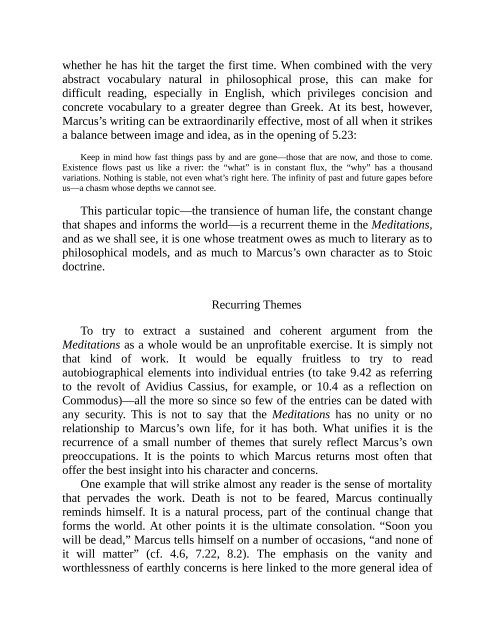9781945186240
Create successful ePaper yourself
Turn your PDF publications into a flip-book with our unique Google optimized e-Paper software.
whether he has hit the target the first time. When combined with the very<br />
abstract vocabulary natural in philosophical prose, this can make for<br />
difficult reading, especially in English, which privileges concision and<br />
concrete vocabulary to a greater degree than Greek. At its best, however,<br />
Marcus’s writing can be extraordinarily effective, most of all when it strikes<br />
a balance between image and idea, as in the opening of 5.23:<br />
Keep in mind how fast things pass by and are gone—those that are now, and those to come.<br />
Existence flows past us like a river: the “what” is in constant flux, the “why” has a thousand<br />
variations. Nothing is stable, not even what’s right here. The infinity of past and future gapes before<br />
us—a chasm whose depths we cannot see.<br />
This particular topic—the transience of human life, the constant change<br />
that shapes and informs the world—is a recurrent theme in the Meditations,<br />
and as we shall see, it is one whose treatment owes as much to literary as to<br />
philosophical models, and as much to Marcus’s own character as to Stoic<br />
doctrine.<br />
Recurring Themes<br />
To try to extract a sustained and coherent argument from the<br />
Meditations as a whole would be an unprofitable exercise. It is simply not<br />
that kind of work. It would be equally fruitless to try to read<br />
autobiographical elements into individual entries (to take 9.42 as referring<br />
to the revolt of Avidius Cassius, for example, or 10.4 as a reflection on<br />
Commodus)—all the more so since so few of the entries can be dated with<br />
any security. This is not to say that the Meditations has no unity or no<br />
relationship to Marcus’s own life, for it has both. What unifies it is the<br />
recurrence of a small number of themes that surely reflect Marcus’s own<br />
preoccupations. It is the points to which Marcus returns most often that<br />
offer the best insight into his character and concerns.<br />
One example that will strike almost any reader is the sense of mortality<br />
that pervades the work. Death is not to be feared, Marcus continually<br />
reminds himself. It is a natural process, part of the continual change that<br />
forms the world. At other points it is the ultimate consolation. “Soon you<br />
will be dead,” Marcus tells himself on a number of occasions, “and none of<br />
it will matter” (cf. 4.6, 7.22, 8.2). The emphasis on the vanity and<br />
worthlessness of earthly concerns is here linked to the more general idea of


